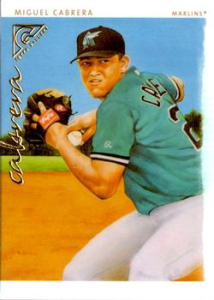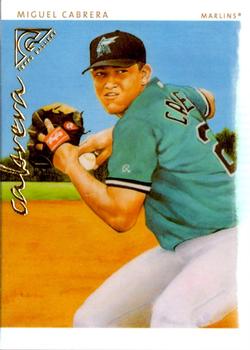June 20, 2003: Miguel Cabrera hits walk-off home run for Marlins in his major-league debut
 The Florida Marlins started the 2003 season slowly. At 16-22 on May 11, the Marlins fired Jeff Torborg as manager and hired 72-year-old Jack McKeon as his replacement. The new skipper inherited a team that had just promoted rookie southpaw Dontrelle Willis from Double A on May 9.
The Florida Marlins started the 2003 season slowly. At 16-22 on May 11, the Marlins fired Jeff Torborg as manager and hired 72-year-old Jack McKeon as his replacement. The new skipper inherited a team that had just promoted rookie southpaw Dontrelle Willis from Double A on May 9.
The Marlins played slightly better under McKeon over the next month but still came into a June weekend series against the in-state rival Tampa Bay Devil Rays at 35-39. With left fielder Todd Hollandsworth off to a slow start, the Marlins called up 20-year-old Miguel Cabrera to play left.
Cabrera, a Venezuelan, had signed with the Marlins in 1999 as a 16-year-old for $1.8 million. He began his minor-league journey in 2000 as a shortstop for the Gulf Coast League Marlins. At the outset of the 2003 campaign, Florida promoted Cabrera, who had shifted from shortstop to third at the urging of Marlins coach Ozzie Guillen, to the Double-A Carolina Mudcats. Cabrera mashed for the Mudcats, hitting .365 with 10 home runs and 59 RBIs in 69 games. He played third base for the Mudcats exclusively until getting several starts in the outfield in the week before his promotion.
The Marlins announced that they were promoting Cabrera to the big leagues after beating the New York Mets 5-1 behind seven shutout innings from Tommy Phelps on June 19. The win moved Florida into fourth place, a half-game ahead of the Mets.
“Miguel Cabrera is going to be a big leaguer, there is no question in our minds. He is coming up in a different position than we envisioned, than he envisioned,” said Marlins general manager Larry Beinfest. “We are looking for more production in left field and Miguel will have that opportunity.”1 Marlins owner Jeffrey Loria was also excited for Cabrera’s arrival, saying: “We’ve got a lot of good young blood in the organization and it’s time for the fans to see it.”2
On a humid Friday evening, the Marlins opened a three-game weekend series against Tampa Bay.3 In their sixth season after entering the major leagues as an expansion club in 1998, the Devil Rays were in last place in the AL East, 17½ games behind the New York Yankees. Although off to a rough start, Tampa had some reasons for optimism in 2003. Lou Piniella, who had overseen a run of success leading the Seattle Mariners, was in his first year as Devil Rays manager after being “traded” to Tampa Bay for outfielder Randy Winn. The Devil Rays also had an exciting young outfield duo of Carl Crawford and Rocco Baldelli, both 21 years old.
The Marlins started lefty Mark Redman. Redman, in his first year with Florida after pitching for the Minnesota Twins and Detroit Tigers, came into the start 5-2 with a 2.80 ERA. The Devil Rays countered with Rob Bell, who was making his second start with Tampa Bay after beginning the season in the minors. Against the Pittsburgh Pirates on June 14, Bell had surrendered six earned runs in 3⅓ innings.
The Devil Rays used a bloop single from third baseman Damian Rolls, a double by Baldelli, and a sacrifice fly by right fielder Aubrey Huff to take a 1-0 lead in the first inning. They seemed ready for more runs when catcher Toby Hall and first baseman Travis Lee each singled to lead off the second. After those two hits, however, Redman retired 19 in a row. In its game recap, the South Florida Sun-Sentinel said the Devil Rays “could not solve [Redman’s] mix of 73 mph curves, 66 mph changeups, and 85 mph fastballs.”4
Meanwhile, Bell retired the first nine men, including a strikeout of Cabrera in his first major-league at-bat. Speedy center fielder Juan Pierre broke the string by leading off the bottom of the fourth with a triple.5 Second baseman Andy Fox, starting in place of regular Luis Castillo, drove in Pierre on a groundout to tie the game, 1-1.
That was the only run Bell allowed in six strong innings. Piniella relieved Bell with Jesús Colomé in the seventh. Colomé pitched a scoreless frame, inducing a double play off the bat of Cabrera to keep the game tied heading to the eighth.
With one out in the top of the eighth, Crawford tripled to give Tampa Bay its first baserunner since the second.6 With the go-ahead run 90 feet away, Ben Grieve pinch-hit for pitcher Colomé. McKeon stuck with Redman, who rewarded him by striking out Grieve and getting Julio Lugo to fly out to Cabrera in left.7
Pinch-hitting for Redman in the Marlins’ half of the inning, Hollandsworth singled and took second on a sacrifice. But neither Fox nor catcher Iván Rodríguez could drive him in.
Braden Looper retired the Devil Rays in order in the ninth. After Huff struck out looking for the third out, he tossed his helmet in frustration. Home-plate umpire Chris Guccione ejected Huff. Huff said after the game that he threw his helmet in frustration at himself.8 Piniella came out to argue the call and was also ejected.
The Marlins had scoring opportunities in both the ninth and 10th against Travis Harper but could not push across the winning run. The Marlins had two men on with one out in the ninth but Gonzalez and Cabrera both made outs. In the 10th, the Marlins left the bases loaded. Tampa Bay stranded runners on first and second against Armando Almanza in the 11th.
With the game still tied, the Devil Rays brought in Al Levine for the 11th. Levine had signed with Tampa Bay on April 2 after being released by St. Louis. He was off to an effective start and came into the game with a 1.54 ERA. After Marlins first baseman Derrek Lee flied out to right, shortstop Álex González doubled to left. That brought in Cabrera, still searching for his first hit.
Cabrera, who did not arrive at Pro Player Stadium until 3:30 P.M., came up to the plate looking for a fastball after Tampa Bay had fed him a steady diet of fastballs the entire game.9 Sure enough, on the first pitch, Levine threw a fastball. And Cabrera connected, swatting the ball 491 feet over the center-field fence for a game-winning home run and his first major-league hit.
As Cabrera circled the bases in South Florida, his parents watched proudly on TV from Cabrera’s hometown of Maracay, Venezuela.10 Cabrera was mobbed by teammates at home plate and smothered by a shaving-cream pie to the face. “It’s unbelievable,” he said. “I still can’t believe it.”11 “I called it,” said McKeon. “I said in the dugout that this kid was going to win the game for us.”12
The Marlins completed the sweep of the Devil Rays over the next two days behind strong starts from Willis and Carl Pavano. Florida played well enough in the second half to secure the NL’s wild card with a 91-71 record.
Once in, the Marlins surprised the baseball world by defeating the San Francisco Giants in the NL Division Series, the Chicago Cubs in the Championship Series, and the New York Yankees to win the World Series. Cabrera finished his rookie season hitting 12 home runs and posting a 106 OPS+. He finished fifth in the NL Rookie of the Year voting; teammate Willis received the award.
In October Cabrera impressed, playing right field for the first time since Little League and even batting cleanup. Hitting coach Bill Robinson credited Cabrera’s wife at the time, Rosangel, for keeping him calm.13 Cabrera’s October exploits, which included hitting a home run off Roger Clemens in the World Series, made him a hero in his native Venezuela, from where his family and friends watched proudly on television.14
After he made the All-Star team each of the next four seasons, the Marlins traded Cabrera (along with Willis) to the Detroit Tigers. With Detroit, Cabrera proved himself to be a Hall of Famer, winning two MVP Awards and the 2012 Triple Crown, surpassing 500 home runs, and joining the 3,000-hit club in 2022.
Acknowledgments
This article was fact-checked by Mark Richard and copy-edited by Len Levin.
Sources
In addition to the sources cited in the Notes, the author consulted Baseball-Reference.com and Retrosheet.org for pertinent information, including the box score and play-by-play.
https://www.baseball-reference.com/boxes/FLO/FLO200306200.shtml
https://www.retrosheet.org/boxesetc/2003/B06200FLO2003.htm
Notes
1 Tom D’Angelo, “Cabrera Called Up After Win,” Palm Beach Post, June 20, 2003: 27. Cabrera had started at third base in every game for the Mudcats in 2003 before moving to left field for his final three games with Carolina.
2 Mike Phillips, “Cabrera to Be New Left Fielder,” Miami Herald, June 20, 2003: 49.
3 The interleague series between the two Florida teams is known as the Citrus Series.
4 Ted Hutton, “Hello and … Goodbye,” South Florida Sun Sentinel (Fort Lauderdale), June 21, 2003: 59.
5 Pierre led the major leagues with 65 stolen bases and finished 10th in NL MVP voting.
6 Crawford led the American League in triples four times (2004-06, 2010).
7 Cabrera caught five fly balls in left field.
8 Scott Carter, “Rays Ejected Then Dejected,” Tampa Tribune, June 21, 2003: 35.
9 Clark Spencer and Kevin Baxter, “A Smashing Debut,” Miami Herald, June 21, 2003: 41, 43.
10 Spencer and Baxter.
11 Spencer and Baxter.
12 Hutton, “Hello and … Goodbye.”
13 Kevin Baxter, “Versatility Gives Rookie an Edge,” Miami Herald, October 14, 2003: 92.
14 Brian Ellsworth, “For Venezuelans, ‘Miguelito’ belongs in World Series, South Florida Sun-Sentinel, October 21, 2003: 1, 8.
Additional Stats
Miami Marlins 3
Tampa Bay Devil Rays 1
Pro Player Stadium
Miami, FL
Box Score + PBP:
Corrections? Additions?
If you can help us improve this game story, contact us.


